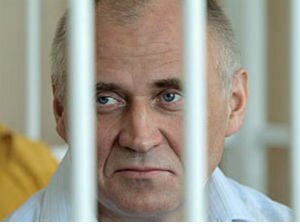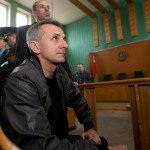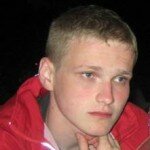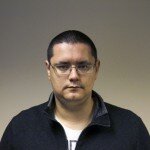
I should have written about Mikola Statkievich long time ago. But what stopped me, was a very close relationship with Mikola. During the campaign «Week of political prisoner” I realized that the personal point of view should always give way to objectivity.
Road to light
I would like to start from a short story that told Mikola Statkevich in September 2006, in his essay, written in the countryside, where he was serving forced labour sentence.
“It was on one of the polygons on the Kazakh steppe where our squad was sent from the north to serve the shooting exercises for the aircraft. The headquarter of the brigade, in which I was responsible for the instrumentation, was deployed in a bunker with very difficult access, like a maze with obstacles. One day I had to urgently come to the surface, and a local instructor said that there is another easy way out – a dark corridor. He closed the door behind me, and I found myself in total darkness. I wanted to go back to the control room in the command post, where there were glowing green and blue screens and boards. I moved forward and reached out in front of me. Almost immediately, I came across a cool wall of the corridor. I changed direction. Again quite quickly – the wall. Over time and number of tries, I chose direction, which led me to armored doors, behind which was the sky and the sun-drenched prairie. ”
Symbolic remembrance
Future soldier, scientist and politician was born on August 12, 1956 in the village of Liadno in the area of Sluck. His parents were teachers. Statkievich lineage derives from the indigenous Belarusian nobility, arms “Kosciesha”, which was used by more than 200 families – Belarusian, Ukrainian, Lithuanian and Polish, including the ancestors of Polish Marshal Jozef Pilsudski.
Mikola’s Mother unfortunately is no longer in this world, while his father, Viktor Pavlovich, regardless of advanced age (86 years) and a number of diseases lives in Baranovichi to this day, being for many an examples of courage and nobleness.
Every year on May 9 he receives wishes from local activists of the democratic movement. During World War II, as a young man he and his father helped guerrillas. They took part in the actions of sabotage: undercut telephone poles disrupting communication of fascist troops. Once they came up on a German soldier who fired at Viktor, but his father shielded him with his body.
In early April 2011, some independent media informed that Viktor Statkieviczh left Belarus for Ukraine, where his eldest son, Alexander, lives. In fact, he only visited him in order to attend the wedding of his grandson, Andrei. He met also with the other grandchildren – Katya and Anya – Mikola’s daughters who came from Germany. Katya obtained PhD and works with her husband in Audi corporation Anya is raising a young son Lyon, her husband is a businessman.
Soldier’s choice
In the military service, serving in air defense does not bode dizzying promotion. Hardly anyone dreams of general’s degree, it is even difficult to become lieutenant colonel or colonel. The only thing that may attract one is the absence of “human factor.” This is an army of intellectual.
Maybe it determined Mikola Statkevich’s service choice. At that time the status of the military man was respected. Hence recruit epaulets allowed poor family of teachers not to worry about the future of their son.
In 1973, Mykola Statkevich joined Minsk Missile Engineering University, which he successfully completed in 1978. He was assigned to the Arctic Circle, Murmansk District.
He served there for four years. He was recognized as the best officer in his specialization in the unit. His task was to protect the entire area of the far north of the European part of the USSR. He received the title of expert in the military classification.
In 1982, he returned to the University where he worked as an assistant and later as a lecturer.
Political azimuth
Many on Statkievich’s place would stop any other activity. Because what else do you need in life? Prestigious position, good salary, career prospects …everything was going well to him. During his work at the University, he wrote more than 60 scientific papers in the field of command, ergonomics and social psychology. He was to do PhD.
Perhaps today he would be a doctor or professor. And a general. As some people today who at that time had lower military degree.
For example, major Sheyman. Anyway, thanks to him I signed up in the history of our country. It was September 15, 1992 when members of the newly organized by Mikola Statkevich Belarusian Military Association took an oath of fidelity to Belarus. My signature is on one card with the signature of Victor Sheyman.
Given the environment of the current president, you may find among his closest coworkers those who then declared their support to democracy. For example, today’s Information Minister Aleh Proleskovski.
Crossroads
As we may read in the biography of Mikola Statkevich, published on his website: “Even before the decomposition of the Soviet Union, I developed and published the concept of the Belarusian army that was implemented later, after the announcement of our country’s independence. At the beginning of 1991 in protest against the suppression of the demonstration in Vilnius, I left the ranks of the CPSU. On August 20, 1991, I as a Belarusian soldier publicly came out against coup in Moscow. Then I announced the creation of the Military Belarusian Association, which purpose was the organization of the Belarusian army, defense of independence, and historical and patriotic education of the society. ”
Please note the date. At that time it was not sure who would win. However, clearly soldier Mikola Statkevich knew very well what awaits him and his allies in the case of failure.
And another very important moment. In 1993, Mikola Statkevich objected to the arrangement of The Collective Security Treaty Organization (CSTO). According to which Belarus was obliged to send its troops into foreign wars. For this he was removed from the army. It happened a month before he was to defend his PhD thesis.
After extensive public campaign supporting Statkievich, Belarusian parliament ratified a collective agreement, however, on condition of not sending troops to so called “hot spots.”
Political kaleidoscope
I am well aware of the conflicting opinions of different people about what has happened and is happening in the environment of the Belarusian social democrats. Here, however, I approach the subject biographically. I limit myself to facts and one observation: Belarusian social-democrats can be called record holders in the field of internal divisions. And in each of these cases at the root of the problem lay leadership split.
Mikola Statkevich joined social democrats at the very beginning of their emergence on the political scene, when in March 1991, on the initiative of Michael Tkachev was created the Gramada Belarusian Social Democratic Party. Michael Tkaczou was its chairman, and Aleh Trusou served as a deputy chairman. A year after the death of Tkachev, Trusou assumed the leadership of the party, where he remained until the summer of 1995.
In 1995, Aleh Trusou was replaced by Mikola Statkevich. In 1996, the Gramada Social Democratic Party, allied with the National Agreement and founded the Belarusian Social Democratic Party (Narodnaya Gramada). Mikola Statkevich became its chair.
In 2005 was organized another attempt to unify party and there was a split. There was established Belarusian Social Democratic Party (People’s Assembly) and Alexander Kozulin became its leader. Today BSDPis is headed by Irina Weshtard. Mikola Statkevich supporters formed the organizing committee to create Renewed Social Democratic Party (Narodnaya Gramada), and Statkievich became a chairman.
Thorny trail
During his political activities Statkevich was arrested more than 30 times, usually for 24h or was fined, three times the authorities were instituting criminal charges against him.
In 2005, together with Paul Sieviaryniec he was sentenced to three years of restriction of liberty for organizing a peaceful demonstration against falsification of national referendum. The referendum gave the president the right to hold office indefinitely.
During his sentence he worked for a year as an electrician at the plant in Baranovichi (forced labour), then he was a locksmith in a kolkhoz. In 2006, an international organization Amnesty International considered Mikola Statkevich a prisoner of conscience. In July 2007, he was freed under an amnesty.
In 2009, Congress of the European Coalition, which Statkevich chaired since 2003, put forward his candidacy for president in the election of 2010. December 19, 2010 he took part in the demonstration on the October Square. He was arrested after the dispersal of the demonstration.
On May 26, 2011 a court in Minsk, under the chairmanship of Judge Lyudmila Gracheva, sentenced Mikola to six years in maximum security penal colony. Currently Mikola Statkevich is the only imprisoned former presidential candidate.
It is not necessary to describe all details of his arrest and transfer to the colony. If one wants to learn more on this topic, I recommend my books “Against the Stream” and “Life after the judgment” which may be found in virtual library. Address http://kamunіkat.org/usіe_knіhі.html?pubіd=20069
Most importantly, the political paths taken by Mikola Statkevich are always defined by his ability to stick to the truth. Today he bears the consequences of that. But he still refuses to write request for clemency.
Alexander Tomkovich
novychas.info




